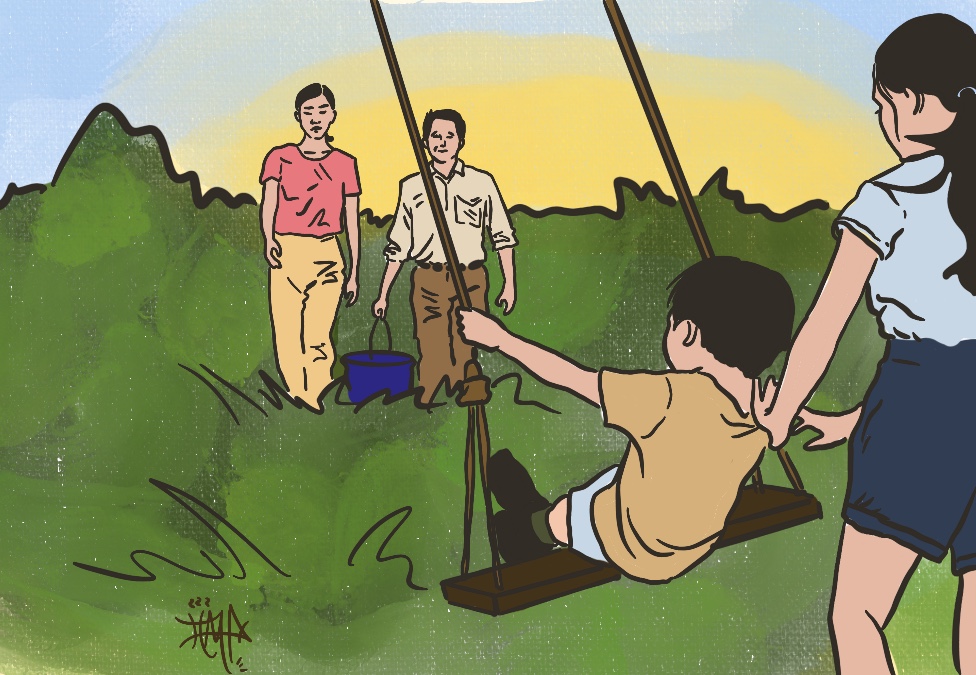Minari and the American dream
March 31, 2021
When David hears his Mom and Dad shouting about things he doesn’t understand in the living room, his solution is to make paper airplanes with his sister. They scrawl “DON’T FIGHT” on them, and then send them careening into the living room to spread their message.
It’s moments like these that made me appreciate the realism of Lee Isaac Chung’s new film Minari.
Minari tells the bittersweet story of the Yi family, who are Korean immigrants trying to start a new life in Arkansas during the 1980s.

Jacob, portrayed by Walking Dead alum Steven Yeun, tries his best to fulfill his patriarchal duties and creates a farm to try and sell Korean vegetables, while his wife Monica and children David and Anne adjust to their new home.
Both parents have jobs as chicken sexers, but Jacob desperately wants to build up his farm to provide for his family and earn a more respectable living.
The arrival of the lovable grandmother Soon-ja turns the Yi household upside down, and the film shows us how these beautifully complex and flawed characters maneuver the trials and tribulations of American life.
Minari very realistically depicts the immigrant experience at the time, rife with racial stereotypes and uncertainty about how to reconcile the culture they come from with the one they currently live in.
My immediate reaction after watching Minari was confusion. It clearly is a movie that has a message that it’s trying to convey, but it isn’t really apparent what it is at first.
That isn’t necessarily a bad thing; I believe a good film should you make you think in general. But it did leave me somewhat frustrated at first. I didn’t understand the point of what I had just watched.
There are many messages you can take from this film, but I eventually came to the conclusion that the main point of Minari is centered around acceptance. Just a warning, there will be major spoilers beyond this point.
Jacob, the family patriarch, is so obsessed with achieving his dreams of having a successful farm that he neglects the wellbeing of his family. We see this quite clearly as Jacob secretly diverts the water supply for his family to use for his failing crops.
It works, as the crops recover soon after, but the taps in his home no longer work. He is choosing his dreams over his family, and we can literally see it play out in front of our eyes.
His wife Monica picks up on this early on, and multiple times throughout the film we see her threaten to leave Jacob if his priorities don’t shift. Jacob’s internal struggle as well as the tension between the spouses is the main conflict of the film.
Monica decides she’d had enough after Jacob seals his first deal, saying that she’s leaving him. Jacob, realizing what he’s done, numbly accepts this.
Just as an aside, Yeun plays this scene beautifully. He says only a couple words in response to Monica’s emotionally charged monologue, and lets only his face show Jacob’s sorrow for several seconds.
However, things change when they arrive home and the storehouse is going up in flames. Jacob’s first instinct is to save his vegetables; to save and protect his dream. Monica charges in after him to help, but is affected by the smoke more harshly and falls.
Jacob, screaming incoherently, finally comes to his senses and forgets the veggies. He carries his wife to safety as the inferno consumes the storehouse, and they hold each other as they cough and cry.
He realizes all at once that achieving your goals is meaningless without loved ones to celebrate with you. The irony here is that the only reason Jacob was so obsessed with his farm was that so he could ensure the wellbeing of his family.
This leads us to what I believe is Minari’s central message: the more effort you put into something, the easier it can be to lose sight of why you’re doing it. And that sometimes the best thing we can do for those around us is to take a step back and breathe.
Minari operates on many levels; its narrative is not the only thing it has going for it. The fire at the end of the film is an important symbol in Jacob’s relationships. It symbolizes the controlled burns that farmers use to cultivate the soil for the next harvest.
In the context of the film, the fire at the storehouse is destroying Jacob’s dream in order to cultivate the soil of his relationships to his wife and children.
There’s also the motif of water that shows up sporadically throughout the film, and how it can be seen as a stand-in for love. Jacob diverts his love from his family to his crops by diverting the water supply. His love for his dreams outweighs his love for his family.
Minari is the kind of movie that grows on you the more you think about it. There are even more ideas to explore, such as how we approach work, what “home” really means or the American dream.
One might come away from Minari feeling confused as I did, but the more one thinks about it, talks about it and reflects on its themes, the more I believe it has to offer.







